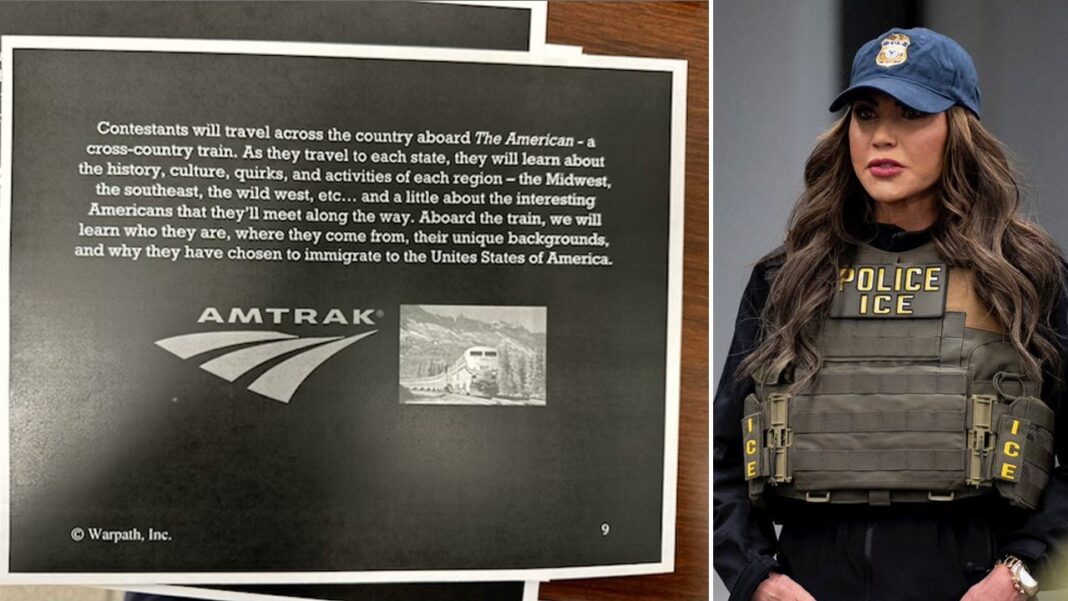## Duck Calls & Detention Centers?
The Department of Homeland Security is reportedly considering a reality show pitch from the producer of “Duck Dynasty” – a show that, ironically, centered around a family whose patriarch was known for his controversial, anti-immigrant rhetoric.
The proposed show, focused on the lives of immigrants in the US, has sparked outrage and raised serious questions about the ethics of using human stories for entertainment, especially within the context of immigration policy.
Is this a genuine attempt at understanding the immigrant experience, or a cynical cash grab that exploits vulnerable populations for profit? Read on as we delve into the controversial proposal and its potential implications.Past Reception: Investigating Previous Iterations of the Pitch
Rob Worsoff, the producer behind hit reality shows like “Duck Dynasty” and “Millionaire Matchmaker,” has a unique proposition for the Department of Homeland Security (DHS): a reality show centered around immigrants vying for U.S. citizenship. This isn’t a new idea. Worsoff claims to have pitched this concept, titled “The American,” to the DHS during both the Obama and Biden administrations. According to Worsoff, the response was consistently positive, though details about the specifics of these interactions remain unclear. It is important to note that this assertion has not been corroborated by the DHS itself.
The Producer: A History of Reality TV and Immigration
Rob Worsoff’s Background
Worsoff’s experience in reality television production, particularly with shows like “Duck Dynasty” and “Millionaire Matchmaker,” suggests a keen understanding of how to craft compelling narratives and create engaging television. However, his foray into immigration-themed content raises questions about whether his production expertise translates effectively to such a sensitive and complex topic.
Worsoff’s Vision
Worsoff envisions “The American” as a positive and inclusive show that celebrates the immigrant experience. Contestants would participate in competitions across the United States, showcasing the country’s diverse cultural landscapes and historical significance. The ultimate prize: expedited citizenship. Worsoff also emphasizes that the show aims to spark a national conversation about what it means to be American, a conversation he believes is increasingly crucial in today’s polarized society.
Addressing Criticism
While Worsoff maintains that “The American” will be a heartwarming and kind show, it’s inevitable that the concept will face criticism. Concerns regarding the potential for exploitation, cultural appropriation, and the manipulation of immigrants’ stories for entertainment purposes are valid and require careful consideration. Worsoff acknowledges these concerns and insists that the show will prioritize ethical treatment and respect for the contestants’ experiences. However, it remains to be seen how these assurances will translate into practice.
Implications and Concerns: A Reality Show with Real-World Stakes
Ethical Considerations
The very premise of “The American” raises several ethical dilemmas. Critics argue that using vulnerable individuals seeking a better life for entertainment purposes is inherently exploitative. The pressure to compete, coupled with the potential for public scrutiny and judgment, could create a highly stressful environment for contestants, especially those who have already endured significant hardships. Furthermore, the show risks reducing complex human stories to simplified narratives that cater to a mass audience, potentially perpetuating harmful stereotypes and misconceptions about immigration.
Impact on Immigration Policy
“The American” has the potential to significantly influence public perception of immigration. By casting immigrants as contestants vying for a prize, the show risks reinforcing the idea of immigration as a competition rather than a humanitarian issue. This framing could further fuel anti-immigrant sentiment and undermine efforts to create a more humane and equitable immigration system.
The Role of Entertainment in Shaping Public Discourse
Reality television has a profound impact on shaping public discourse. Shows like “The American” can influence how we understand complex social issues, often by presenting simplified and often biased narratives. It is crucial to critically analyze the messages conveyed through such shows and recognize their potential to shape public opinion, particularly on sensitive topics like immigration. We must be mindful of the power of entertainment and its ability to influence our understanding of the world around us.
Conclusion
The proposal by Duck Dynasty producer, Phil Robertson, for an immigrant-themed reality show has ignited a firestorm of controversy. While Robertson claims his intention is to showcase the “American dream” through the lens of newcomers, critics raise concerns about potential sensationalism and exploitation of vulnerable individuals. DHS’s openness to reviewing the pitch, however, underscores the complex intersection of entertainment, immigration, and public perception.
This incident begs the question: what role should reality television play in shaping our understanding of immigration? Can a show, inherently designed for entertainment, offer genuine insights into the immigrant experience? Or will it perpetuate harmful stereotypes and contribute to the ongoing political debate surrounding immigration policy? The answer remains unclear, but one thing is certain: the proposed show, regardless of its production, will undoubtedly spark a much-needed conversation about the realities of immigration, the power of media representation, and the human stories that often get lost in the political noise. We must approach this conversation with empathy and critical thinking, ensuring that the voices of immigrants themselves are heard and respected.
The future of this proposed show hangs in the balance, but the conversation it has ignited will undoubtedly continue to resonate. It serves as a stark reminder that the narratives we consume, even those presented as entertainment, have the power to shape our understanding of complex social issues. Ultimately, it’s up to us to demand responsible and nuanced portrayals of immigration, ones that celebrate the richness and diversity of human experience while promoting understanding and empathy.
